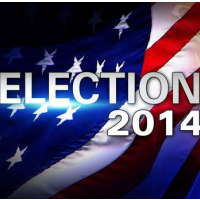Blue California Watches the Red Tide of Conservatism Wash over the Country

As expected, California galloped off in the opposite direction from the rest of the country Tuesday night, electing Democrats to run government, voting for a less muscular approach to crime and supporting funds for rebuilding public infrastructure.
Jerry Brown won his fourth term as governor and Democrats were leading all eight statewide races late into the night.
Neither U.S. Senator from California was up for re-election, but the ballot included 53 U.S. House seats, 20 state Senate and 80 Assembly races, six statewide ballot measures and a lot of important local races.
While state Democrats were contemplating re-establishing a supermajority in the Senate and Assembly, which would further limit Republican influence on legislation, the voters across the country returned control of the U.S. Senate to the GOP. Pundits have been predicting a resounding Republican victory in Congress and statehouses and they weren’t wrong.
Nearly every perceived close Senate race went to Republicans, including the election of Iowa Tea Party favorite and hog farmer Joni Ernst, who playfully implied she would castrate Democrats when she got to Washington. The lone exceptions were Democrat Jeanne Shaheen, who held off Massachusetts carpetbagger Scott Brown in the New Hampshire race, and Mark Warner in Virginia, who squeaked in after having once been a heavy favorite. The winner of the Alaska race might not be known for days.
The GOP won hotly contested gubernatorial races in Michigan, Kansas, Florida and Wisconsin, and added to their already large majority in the House of Representatives.
Democrats and a lot of pundits credited the GOP sweep to a quirk of the electoral map, which had Democrats defending far more seats in a year of voter discontent. They could afford to lose five of the races, but lost at least seven. Traditional low turnout in midterm elections also did not bode well for the Democrats, which have an electorate known for not showing up at the polls in off years.
Midterm elections are also notoriously deadly for the party occupying the presidency, and in this case, it was a president whose popularity has reached its nadir. But despite Democrats taking five of the last six presidential elections, it’s hard to deny that the nation has moved decisively to the right in the 34 years since President Reagan was first elected.
The Republicans also benefited from some clever gerrymandering, voter ID laws and other voter suppression techniques, and a boatload of untraceable campaign contributions.
None of that affected California voters.
They passed propositions to pay for water supply infrastructure projects, establish a rainy day budget fund and reclassify some “nonserious and nonviolent property and drug crimes” from felony to misdemeanor. A proposition to raise medical malpractice claim limits and drug-test doctors lost as did ones to empower the Insurance Commissioner to approve health insurance rate changes and allow Indian casinos on non-tribal lands.
California residents do share one trait with their fellow U.S. citizens—they don’t like to vote. The state appears to have set a new record for apathy in a statewide general election. The Field Poll estimated that a miserable 46% of registered voters would cast a ballot, knocking 4.6 percentage points off the previous record low. That’s only 34% of the state’s eligible voters.
–Ken Broder
Riding Wave of Discontent, G.O.P. Takes Senate (by Jonathan Weisman and Ashley Parker, New York Times)
Republicans Seize Control of Senate in U.S. Midterm Elections (by Steve Holland and John Whitesides, Reuters)
Jerry Brown Makes History, Wins Fourth Term (by Michael Finnegan, Los Angeles Times)
California’s Election May Set Record for Apathy (by Christopher Cadelago, Sacramento Bee)
California General Election Results: November 4, 2014 (CBS SF Bay Area)
- Top Stories
- Controversies
- Where is the Money Going?
- California and the Nation
- Appointments and Resignations
- Unusual News
- Latest News
- California Forbids U.S. Immigration Agents from Pretending to be Police
- California Lawmakers Urged to Strip “Self-Dealing” Tax Board of Its Duties
- Big Oil’s Grip on California
- Santa Cruz Police See Homeland Security Betrayal in Use of Gang Roundup as Cover for Immigration Raid
- Oil Companies Face Deadline to Stop Polluting California Groundwater





